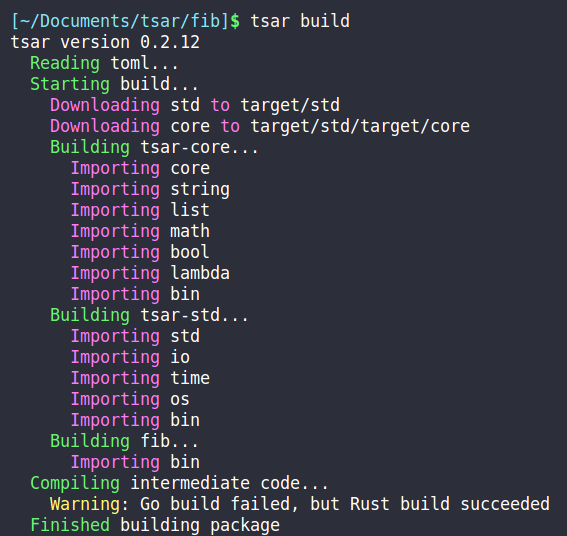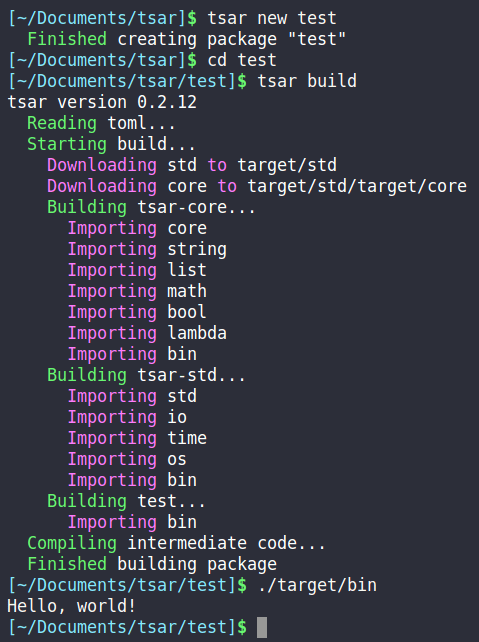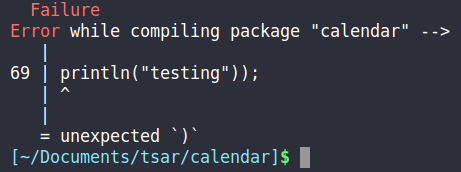20 releases
| 0.3.0 | Dec 22, 2019 |
|---|---|
| 0.2.13 | Nov 6, 2019 |
| 0.2.12 | Oct 19, 2019 |
| 0.1.5 | Oct 6, 2019 |
#233 in FFI
8MB
82K
SLoC
tsar
Tsar is a dynamically typed, ahead of time compiled programming language. Tsar targets the Xasm intermediate representation, which can compile to either Golang or Rust. As a result, if a Tsar program fails to build with Golang (the primary target language), Rust is used as a fallback.

Features
- Dynamic Typing
- Golang and Rust foreign function interface
- Package management system
- First class object and function programming
- Pretty error messages
- Rust inspired syntax
- Python inspired programming
tsar x.x.x
adam-mcdaniel <adam.mcdaniel17@gmail.com>
Compiler for the Tsar programming langauge
USAGE:
tsar [SUBCOMMAND]
FLAGS:
-h, --help Prints help information
-V, --version Prints version information
SUBCOMMANDS:
build Build a Tsar package
help Prints this message or the help of the given subcommand(s)
new Create new Tsar package
run Run a Tsar package
Installation
TODO: Make a document for each respective OS
Install Rust (and optionally Go)
MacOS / Debian / Ubuntu
First, install Rust.
# For *nix only
# Installs Rust
curl --proto '=https' --tlsv1.2 -sSf https://sh.rustup.rs | sh
Then install git.
# For debian based OS only
sudo apt install git
If you want to target golang (highly recommended), install it here
# For debian based OS only
sudo apt install golang-go
# For MacOS, use the golang link above.
Windows
Note that Tsar builds significantly slower on Windows. Expect a couple of seconds of extra time when compiling / running your tsar packages. Using Tsar on linux is recommended.
Before you start, you must install visual studio, and git. You will not be able to compile without these!
Be sure to follow the instructions carefully, and use the defaults for both installers.
Install Tsar
After following the instructions for your respective operating system, run the following in your shell.
cargo install -f tsar
After the installation completes, you will be able to create a tsar package!
Getting Started
TODO: This will become its own book / document in the future
To start, create a tsar package and test it.
# Where I will create my package
cd ~/Documents/tsar
# This will create a package named `test` under a folder with the same name
tsar new test
# Enter the folder
cd test
# Edit your program
nano src/bin.ts
# Compile your package
tsar build
# Your executable is in the `target` folder!
# Alternatively, you can `run` your package
tsar run

Now we can start programming!
Syntax
Although Tsar is meant to behave somewhat like Python, its syntax is inspired by Rust.

If you do somehow make a syntactical mistake, Tsar will try to help correct you.

Comments
Tsar uses C and C++ style comments.
// Im a comment!!
/*
Im also a comment!
*/
println("Im not a comment!");
Use statements
Use statements allow you to import objects from imported modules.
Use statements MUST ONLY be at the top of your file! You may not use use statements anywhere else in your code because of code cleanliness. This allows for more readable code.
Use statements must import by name only, you may not use the * symbol like in Python.
You can use one object from a module like so.
use core::string::fmt;
You can also import multiple objects.
use core::math::{sin, cos, tan};
Identifiers
There are two major kinds of identifiers: unscoped and scoped names.
Unscoped names are just regular identifiers like abc123, tsar, i, hey_jude71.
Scoped names use the :: operator. This operator lets you access names from within modules.
If I want to call the hour function from the time module in the std module, I can do it like so.
println(std::time::hour());
Assignment
Assignment in Tsar is done with the = operator. Variables are declared when they are first assigned to.
a = 5;
a = "String";
println(a);
Loops and If Statements
Loops and If Statements are the structures for control flow in Tsar.
If statements are either single or double pronged like so.
fn odd(n) => n % 2;
fn collatz(n) {
if odd(n) { 3 * n + 1 }
else { n / 2 }
}
if true {
println(collatz(5));
}
Parentheses are not required for loop or if statements.
While loops are executed until the test expression is false.
n = 10
while n isnt 0 {
println(n);
n = n - 1;
}
println("loop finished");
For loops iterate over each index and value in a list.
use core::string::fmt;
for index, element in range(0, 10) {
println("Index of element: " + fmt(index));
println("Element itself: " + fmt(element));
}
For unused index or element values when iterating, use the _ variable for good convention sake.
Functions
In Tsar, the stack is shared across different scopes. This means that values returned by functions are simply pushed onto the stack to be retrieved later.
To return a value from a function, just leave the expression to return at the end of your function.
The last line of the function does not require a semicolon.
fn function_name(a, b) {
result = a + b;
result
}
Functions that only do one computation can be written like so.
fn sum(array) => reduce(array, add, 0);
Functions written like this do require a semicolon, though.
Anonymous functions can be expressed with the following syntax.
|a, b| {
result = a + b;
result
};
This function takes two arguments a and b, and returns a + b.
Functions can be called with the () operators like in most other languages.
f = |a, b| { a + b };
fn increment(n) => n + 1;
println(f(4, 5));
println(increment(0));
Objects
Objects are very useful for encapsulating mutating code. To maintain code cleanliness, Tsar does away with class inheritance.
Objects are defined like so.
The new method is used as the constructor for an object. THe new method takes at least one argument (the reference to the current instance), and returns that instance.
YOU MUST RETURN YOUR INSTANCE AT THE END OF THE new METHOD!!!
impl Point {
fn new(self, x, y) {
self.x = x;
self.y = y;
self
}
fn goto(self, x, y) {
self.x = x;
self.y = y;
}
}
To instantiate your object, use the new function.
p1 = new(Point, 5, 6);
println(p1);
Attributes of an object can be accessed similarly to lists with the [] operators as well as the . operator.
impl Example {
fn new(self) {
self.a = 5;
self
}
}
e = new(Example);
println(e["a"]);
println(e.a);
The Prelude
Before you start programming, you should know your available builtin functions imported from the core and std modules.
This function prints an object without printing a newline.
print("test\n");
println
This function prints an object and a newline.
println("test");
list
The following segment creates a list with 3 elements, [1, 2, 3]. The [] syntax to create a list is just shorthand for creating a call to the list functions.
n = 3
l = list(n, 1, 2, 3);
println(l);
len
This function returns the length of a list or string.
println(len("testing"));
println(len([1, 2, 3]));
push
This function returns a list with an object appended to the end.
println(push([1], 2) is [1, 2]);
pop
This function returns
- a list with the last object popped off
- the popped object
impl List {
fn new(self) { self.items = []; self }
fn push(self, item) {
self.items = push(self.items, item);
}
fn pop(self) {
self.items = pop(self.items);
}
}
l = new(List);
l.push(5);
println(l.pop());
range
This function returns a list of values from one number to another (exclusive).
println(range(0, 3))
reverse
This function returns a reversed list.
println(reverse(range(0, 3)));
map
This function maps a list into another using a function.
fn increment(n) => n + 1;
println(
map([0, 0, 0, 0], increment)
);
filter
This function is used to filter a list for accepted values. It takes a list and a function. For each element in the list, if f(element) is true, the item will be placed in the resulting list.
The following will print a list with only odd numbers.
fn odd(n) => (n % 2) is 1;
println(filter([1, 2, 3, 4, 5], odd));
reduce
This function is used to reduce a list into an atomic value. Reduce takes a list, a function to reduce with (that takes two arguments itself), and an initial value.
fn sum(values) => reduce(values, add, 0);
fn factorial(n) => reduce(range(1, n+1), mul, 1);
println(sum([1, 2, 3]));
println(factorial(5));
new
This function creates an instance of an object.
impl Point {
fn new(self, x, y) {
self.x = x;
self.y = y;
self
}
}
p1 = new(Point, 1, 1);
println(p1);
Dependencies
~20MB
~404K SLoC